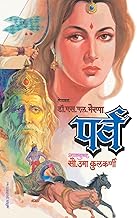
Original Title
Parv
Subject & College
Series
Publish Date
1991-01-01
Published Year
1991
Publisher, Place
Total Pages
773
Format
Paperback
Country
India
Language
Marathi
Average Ratings
Readers Feedback
Parva (पर्व)
Shreyas Rajan Karanjkar, Student of Sinhgad Law College Book review on Parva by S.L. Bhyrappa. Translated (Marathi) by Uma Kulkarni is a historical, philosophical reinterpretation...Read More
Shreyas Rajan Karanjkar
Parva (पर्व)
Shreyas Rajan Karanjkar, Student of Sinhgad Law College
Book review on Parva by S.L. Bhyrappa. Translated (Marathi) by Uma Kulkarni is a historical, philosophical reinterpretation of the Mahabharata.
First published in Kannada language, it got translated into various Indian and foreign
languages, it got translated into Marathi in 1991 by Uma Kulkarni and published by the
Mehta Publishing House, Pune.
This book offers a fresh and human centric perspective to the epic, free from any magical, godly
fairytales and myths. The novel begins in the 12 th century BCE, with Shalya, a king and an uncle to the Pandavas
(the main protagonists of the original epoch), as preparation for the final all out war is going
across the kingdoms of the Aryavarta (ancient name of the Bharata). We get to know the story
behind the upcoming war from the character’s perspectives. Bhyrappa has successfully
portrayed the ancient Bharata’s politics, culture, philosophy, from the character’s point of
views. The main themes of this novel include the nature of Dharma (duty), consequences of
ambition, the impact of patriarchy, the fragility of human relationships and politics of the
contemporary Bharata. Bhyrappa also explored some of the mature themes like sexual
liberation, political dynamics and evolution of the society.
The novel is set in the 12 th century Aryavarta. At the starting of the novel the author has given
a map of the 12 TH century Aryavarta, showing the vast geography of the novel. The story is
Primarily in the Hastinapura and its neighboring kingdoms, Bhyrappa brilliantly portrays the
contemporary politics and personal motives of the characters, giving ‘Parva’ the status of a
magnum opus.
The Characters include Draupadi, Bheema, Kunti, Arjuna and Krishna among with various
other characters from the original epic. Bhyrappa through his almost magical and lucid
writing style humanizes these iconic figures, presenting them as a flawed containing all the
human tendencies like greed, lust, violence and relatable individuals struggling with their
personal motives. Draupadi and Kunti emerges as a symbol of feminism with Bheeshma as
grand old Patriarch.
Bhyrappa is known for his philosophical and lucid writing style, with the Parva his writing
has achieved new literary height. The monologue and conversational format allow for deep
psychological and philosophical exploration of each character, making their emotions and
conflicts more humane. His style is rich and evocative, blending detailed descriptions with
comprehensive insights.
The characters are exceptionally well developed, shedding their mythological grandness to
become deeply humane. Their conflicts with the self and the environment around them adds
level of complexity to the novel, making it hard for the entry level reader. But this complexity
about characters makes this novel an unforgetful read.
The author has followed nonlinear style, we see the story unfolding through various
characters, this kind of style adds more nuance and requires constant attention of the reader.
The pacing varies from character to character some patches feel heavier and more
philosophical making it a slight heavy read, though this helps to build serious narrative of the
novel. We are seeing a recent trend of books on the pretext of the Mahabharata war, but in my
opinion none of these books has really captured the essence of the Mahabharata which this
novel has captured. The book effectively conveys its themes, challenging readers to rethink
and question dharma, morality, sexuality and justice in a historical context.
Parva is a deeply moving novel, the characters introspection evoke anger, empathy,
admiration leaving a long-lasting impact on reader’s mind. In a nutshell it is an emotional
rollercoaster ride.
The author has tried to portray a bold and humane reinterpretation of the Mahabharata, with
exceptional character building and mindful conversations which provide psychological
insight. It has a rich, evocative philosophical undertones.
Because of its dense philosophical parts some readers may feel disconnected with the
narrative. The non-linear format, while it is unique, can be challenging to follow at times.
I found the character’s struggles with duty, morality and sexuality deeply relatable, as the
topics and themes transcend time and culture. Especially Draupadi and Kunti’s character will
easily connect with some readers, because of their critique of patriarchy.
We are living in an age where everyone is in a race of reinterpreting our texts as per their
political narrative, but with the Parva bhyrappa has explored themes like caste, patriarchy,
feminism which are highly relevant in today’s socio-politics.
I recommend Parva to readers interested in Bharata’s history, mythology or philosophical
literature. It is best suited for adult readers because of its mature themes and to understand its
complex philosophical undercurrents.
S.L Bhyrappa’s novel Parva is a literary Magnum Opus that redefines the Mahabharata for
the modern readers, and place it in a historical timeline. In nutshell, bhyrappa also tried to
prove the historicity of the Mahabharata by humanizing the myths. It is both thought
provoking and emotionally impactful. Bhyrappa with his novel almost convinces readers
about the historicity of this epic almost mythical war. A must read for lovers of art, history
and philosophy.
